PRINCETON, NJ -- As U.S. House leaders unveil a plan to reform the U.S. healthcare system, a USA Today/Gallup poll finds 56% of Americans in favor and 33% opposed to Congress' passing major healthcare reform legislation this year. Support for healthcare reform before the end of the year is sharply split along party lines, with 79% of Democrats in favor, compared with only 23% of Republicans.
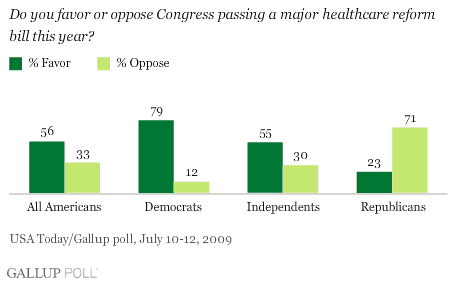
On Tuesday, House Democrats held a press conference in which they introduced their version of healthcare legislation. The Senate is still working on its version. With the specific outlines of healthcare reform still far from settled, the July 10-12 survey explored a number of other issues that Congress is considering as it works toward drafting legislation.
1. Goals of Reform
Any healthcare reform legislation will likely address the twin problems of covering a large number of uninsured Americans and keeping a lid on quickly rising costs for those who do have insurance. When asked which of the two is the more important goal, the public says, by 52% to 42%, that controlling costs is more crucial than expanding coverage.
Self-interest may partially explain people's conceptions of which goal is more important. Those without health insurance believe expanding coverage to nearly all Americans is the more important goal, while those who have insurance believe controlling costs is more imperative.
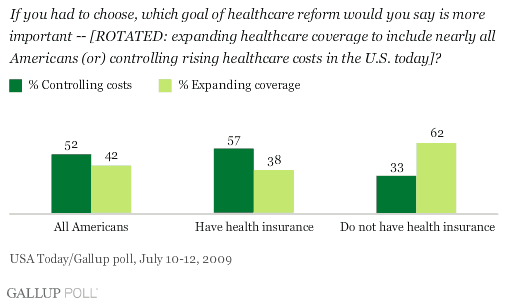
The poll tested five healthcare provisions that deal with choice, access, and cost control, and though there is some variation, at least three-quarters of Americans say each is extremely or very important to them.
At the upper end of the range, 93% of Americans say it is either extremely or very important for their health plan to cover any medical test or treatment they and their doctor think is necessary. Just under 9 in 10 ascribe this level of importance to being able to get health insurance regardless of job status or medical situation, and being able to choose any doctor or hospital they like.
Additionally, 83% say it is important that their health insurance be made more affordable, and 77% say it is important to have the option to keep the health insurance plan they have now.
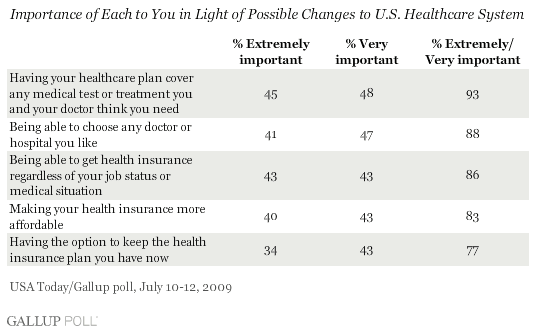
When asked for its views, the public tilts in the direction of favoring this requirement, with 56% saying all Americans should be required to have health insurance; 42% disagree. Politically, 72% of Democrats favor mandatory health insurance, compared with 34% of Republicans.
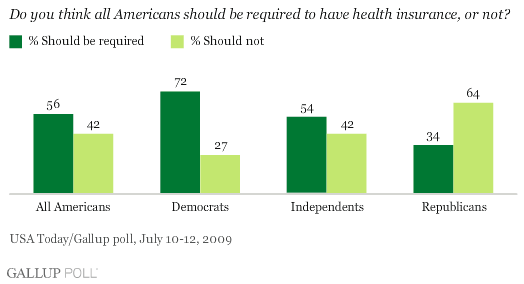
Perhaps the biggest obstacle to healthcare reform will be its high price tag, which some have estimated to be $1 trillion over 10 years.
When asked about six proposals being considered as possible ways to pay for the plan, Americans are most likely to favor a fine on employers who do not offer health insurance to their employees, and increasing income taxes on upper-income Americans.
The public shows more support than opposition for a new tax on soft drinks high in sugar, and reductions in the income-tax deductions upper-income Americans can take for home mortgages and charitable contributions.
Americans oppose taxing employees if their health plan's benefits rise above a certain level, as well as cutting back on Medicare costs. Opposition to the latter may reflect a fear that Medicare services may be cut rather than just being part of a cost-saving effort.
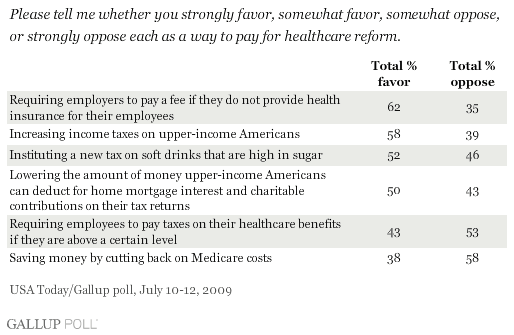
4. The Political Situation
Those, including President Obama, who want to see healthcare reform passed this year have the backing of most Americans, though at 56%, it is hardly an overwhelming majority. And that support could drop, depending on the final details of the plan.
When asked separately how important it is for Congress to pass major legislation this year, half of Americans say it is extremely (26%) or very important (24%) to them, but 47% do not assign a high degree of importance to it.
Thus, it is not clear how strong the public mandate is for healthcare reform this year.
Obama and congressional Democrats are clearly taking the lead in getting healthcare reform done, but when asked which of four groups they trust most on the issue, nearly half of Americans say doctors and hospitals while a third name Obama and the Democrats in Congress. Only small minorities say they trust the Republicans in Congress or insurance companies. These findings largely echo what Gallup found earlier.
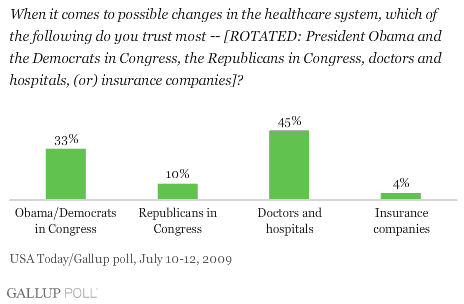
The Obama administration seems more likely to achieve major healthcare reform than did Bill Clinton, in part because some of the major interest groups that opposed reform in the 1990s are on board this time. However, Congress still has much work to do to pass reform, and it is not clear whether the final bill will have enough support to become law after the details are ironed out.
The poll finds that Americans think it is very important to have a wide choice of doctors, treatment options, and health plans, but also want to keep insurance affordable and guarantee access to it regardless of job or medical status. They favor many of the proposals being offered to help pay for reform, but not necessarily by very large majorities.
Survey Methods
Results are based on telephone interviews with 3,026 national adults, aged 18 and older, conducted July 10-12, 2009. For results based on the total sample of national adults, one can say with 95% confidence that the maximum margin of sampling error is ±2 percentage points.
Most questions were asked of a randomly selected half sample of 1,518 national adults, and have a maximum margin of sampling error of ±3 percentage points.
Interviews are conducted with respondents on land-line telephones (for respondents with a land-line telephone) and cellular phones (for respondents who are cell-phone only).
In addition to sampling error, question wording and practical difficulties in conducting surveys can introduce error or bias into the findings of public opinion polls.
